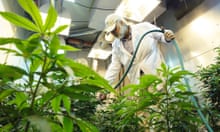As revolutions go, it is hardly an overnight Leninist coup. National statutes, UN protocols and who knows how many luckless souls bolted up in cells round the world affirm that the old prohibitionist order has not collapsed. But the wheel on drug policy is slowly beginning to turn, both within the United States and further afield.
The war on drugs has been a losing fight for 40 years. The response to unending failure has always been to demand more law enforcement and more prison cells. It is unclear why the mood should be changing just now. It isn’t that consumers have suddenly got too numerous to ignore: rates of cannabis use, which had, throughout the late 20th century, seemed to be on an interminable upward trajectory, are now stable or even declining. As for recent scientific developments, these have only reinforced the medical dangers. Since the 1990s a rare but real link with schizophrenia has emerged. And whereas the lack of long-term evidence always used to allow hippies to insist that “nobody ever died from a spliff”, tracking studies exploring a connection with cancer are finally suggesting that cannabis smoke might, after all, have many of the disadvantages long associated with smoke of other sorts.
But then the long century of criminalisation never had any more to do with evidence, than America’s disastrous interwar experiment with prohibiting the undoubtedly-dangerous demon drink. Then, as now, the practicalities of harm-reduction and the principle of not persecuting citizens who harm no one but themselves, point to legalisation.
So it is be welcomed that the last year or so has seen Uruguay instigate a heavily regulated cannabis trade, while Colorado and Washington state have licensed all personal use, with the first stores officially permitted to peddle in the latter opening their doors this month. Elsewhere in the US, the slow tide of tolerance for medical marijuana, which began in California in 1996, continues to spread. Still spreading, too, are other state schemes which forgo full criminal prosecution for pot possession, in favour of parking-style fines. The Economist tots up half of America’s 50 states as having liberalised somewhat; the New York Times, which has just come out against prohibition, factors in a few forthcoming changes, and gets to a total of 35 reformist states, which are home to around three-quarters of all Americans. Either way, the writ of the punitive letter of the federal drug laws – which classes cannabis along with heroin, as “schedule 1” – is not running as it once did.
The mismatch between Washington DC’s unreformed rules and the law as it is actually observed casts a thick fug of confusion over the position. Barack Obama, who – like David Cameron – used drugs in his youth, surely knows that he would not have got where he is today if he had ever been caught, had the book thrown at him and had ended up in jail. He is on the record as saying the war on drugs has been “an utter failure”, and has more recently made positive noises about allowing the Colorado and Washington experiments to run their course. His administration has undertaken not to bring federal enforcement to bear, so long as states give sensible reassurances about preventing dope from passing out of their own borders, falling into the hands of children, or polluting the bloodstreams of drivers to a dangerous extent. All this is welcome, but so long as both president and Congress continue to shrink – as they continue to do – from rewriting the federal statute, it will remain open to any less-liberal future occupant of the White House to turn back the clock.
Thickening the haze is the international position. America led the world to sign up to successive UN protocols and conventions, which reforming countries like Uruguay now find themselves running up against. It seems absurd when states within the US itself are conducting similar legal experiments. Neither federal laws nor UN conventions of the old prohibitionist order can stand in logic any longer.







